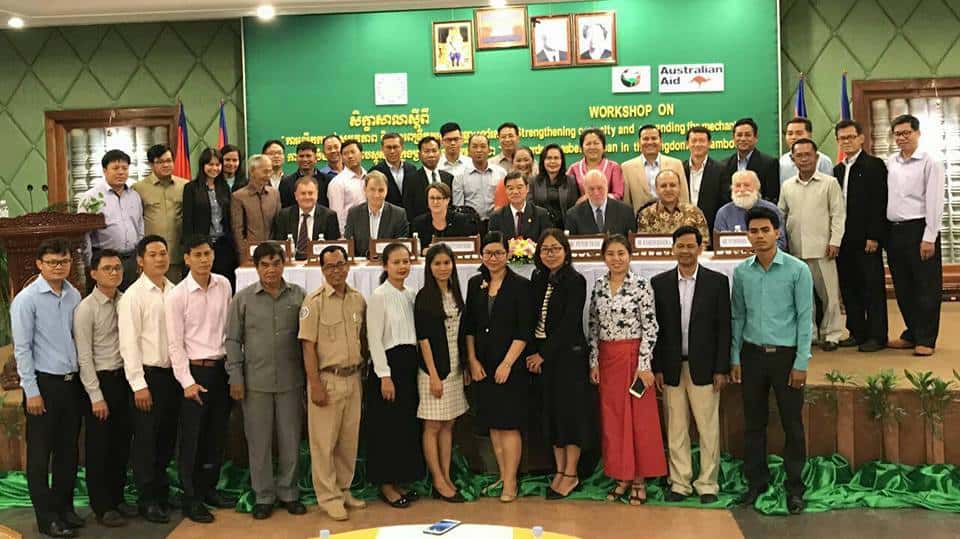5-day training brings asbestos hazard awareness and consensus on the need for a ban on asbestos in Cambodia as soon as possible
Siem Reap, Cambodia – 14 July 2017
PRESS RELEASE
This week, 50 participants from 13 Ministries as well as representatives from trade unions and employers have gathered in Siem Reap Cambodia for an intensive 5-day training on building capacity around asbestos hazards, understanding asbestos related diseases, mapping asbestos use in Cambodia and actions needed to eliminate the cancers and other diseases associated with asbestos.
The training, organised by Ministry of Labour and Vocational Training (MOLVT) with the support of Union Aid Abroad APHEDA (Australia), aimed to also assist members of the National Asbestos Profile Working Group and labour inspectors develop clear evidenced based understanding on asbestos related issues.

The training was also supported by a range of organisations including the Australian government through the Foreign Affairs Department (DFAT), the Australian Government Asbestos Safety and Eradication Agency (ASEA), Right On Canada, International Ban Asbestos Secretariat (IBAS), Asia Ban Asbestos Network (ABAN), Asia Monitor Resource Centre (AMRC) and Solidar Suisse.
The training brought together international and national experts, including Peter Tighe CEO of ASEA and ASEA Director Nick Miller, Professor Yv Bonnier‐Viger from the Faculty of Medicine of Laval University and Regional Public Health Director for Gaspésie‐les‐Îles, in Quebec, Canada, Dr Rokho Kim from the World Health Organisation Office Manila Philippines, Mr Jungho Choi from the International Labour Organization office in Bangkok Thailand and Phillip Hazelton from Union Aid Abroad APHEDA in Vietnam.
Dr Huy Han Song, Secretary of State of MOLVT stated: ‘The training brought international expertise to help us clarify many things in regard asbestos dangers. The main outcomes of the training are we can now move forward quickly to draft a National Profile of Asbestos in the coming 1 year. We will develop a trainers group to build awareness among workers, community and policy makers around this issue. We will provide safety information to those most at risk and begin work on designing and implementing an action plan to achieve the consensus goal of all those present, an asbestos free Cambodia’ he said. ‘The question is too serious to be delayed. It had to be addressed promptly. However, it is a whole country endeavour. It is mandatory to take the time to create awareness among all stakeholders’ he added.
Peter Tighe, CEO of ASEA, explained the importance of Cambodia acting early to limit health impacts to workers and the community and costs for government of continuing to allow asbestos products.
‘Australia is now suffering from the enormous health, economic and environmental cost of our past use of asbestos. We are here in Cambodia to share lessons learnt from Australia and good practice responses to the problem, to help Cambodia develop its own policy to save lives and costs in the future. Australia banned asbestos and ACM’s in 2003 and yet we are still suffering from an estimated 4000 deaths per year from asbestos related diseases. Australia has set up a stand‐alone agency, ASEA, to work on coordination of eradication of asbestos from buildings in Australia and to coordinate managing existing asbestos risks. Given our deadly experience with asbestos, the Australian Government has prioritized our agency to work towards a global ban of asbestos’.
Prof. Yv Bonnier Viger said Canadian experience was timely in the region as Canada has also recently joined many other countries in announcing a ban on asbestos. ‘Currently most countries in the world either don’t use asbestos or have formally banned it. That’s around 124 countries. Only 25 countries still use more than 1,000 tons per year. I am very pleased to say Canada has moved from being the main producer of asbestos fifty years ago to now fully banning asbestos in 2018. All those countries ban or don’t use for a simple reason. This is because of the cancer risks from exposure to this fiber and the readily available substitutes of similar quality and price’ he said.
Nick Miller added ‘We congratulate Cambodia and Ministry of Labour and Vocational Training in particular for this important initiative to develop a National Asbestos Profile, to raise awareness of the risks of asbestos and work towards phasing out of its use as soon as possible’.
Union Aid Abroad APHEDA Country Director Dr Ramesh Khadka committed continuing support for the work of developing the National Asbestos Profile and awareness raising from his organisation and commented ‘Participants noted that, in the context of many countries banning asbestos, Cambodia may become a destination to dump this hazardous material if nothing is done to ban it also’.
Further Information:
Dr Ramesh Khadka +856 11628775
Phillip Hazelton +84917878314